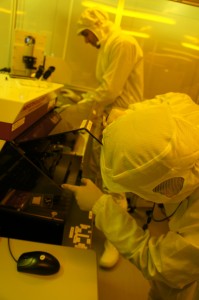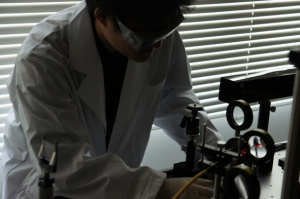Introduction
Introduction ~Earth and human friendly scientific technology ~
Department of the micro-nano system engineering is expanded from the world first department of micro-system engineering established in Nagoya University
 Innovations of the science and technology thanks to the invention of the computer technology, lead to the advanced industrial and information society. It is crystal clear that the science and technology will be remarkably developed in 21st century. In addition, the earth- and human-friendly technologies are demanded reflecting emerging problems in social systems such as resources, energy and global environment. Hence, efforts are needed to make mechanical systems smart, highly integrated and of less energy consumption. For this purpose, ultra miniaturization of conventional technologies has a great importance and state of the art micro-nano system technology promises revolutionary advancements. Considering importance of those requirements, Nagoya University has established department of micro-system engineering in graduate school in 1984. To adapt with new technologies, this department was reorganized within ten years and renamed as department of micro-nano system in 2004.
Innovations of the science and technology thanks to the invention of the computer technology, lead to the advanced industrial and information society. It is crystal clear that the science and technology will be remarkably developed in 21st century. In addition, the earth- and human-friendly technologies are demanded reflecting emerging problems in social systems such as resources, energy and global environment. Hence, efforts are needed to make mechanical systems smart, highly integrated and of less energy consumption. For this purpose, ultra miniaturization of conventional technologies has a great importance and state of the art micro-nano system technology promises revolutionary advancements. Considering importance of those requirements, Nagoya University has established department of micro-system engineering in graduate school in 1984. To adapt with new technologies, this department was reorganized within ten years and renamed as department of micro-nano system in 2004.
Leading in micro-nano technology to support 21st century.
Abstract of the department of the micro-nano system engineering in graduate school of Nagoya University
 With current technological advancements it is highly expected to support the fundamental technologies for 21st century. Developments in the advanced technology to support the industrial and information science areas are highly related to the establishment of the high functional and efficient systems. Therefore, the micro-nano systems technology is going to play a strong and critical role for a broad range of different industrial and information applications such as industrial & production system, information & electronics, aeronautics system and medical and biological engineering.
With current technological advancements it is highly expected to support the fundamental technologies for 21st century. Developments in the advanced technology to support the industrial and information science areas are highly related to the establishment of the high functional and efficient systems. Therefore, the micro-nano systems technology is going to play a strong and critical role for a broad range of different industrial and information applications such as industrial & production system, information & electronics, aeronautics system and medical and biological engineering.
One of the important examples for the micro-nano mechanical system is the micro-nano machining such as sensor, actuator and processor. Although there are several problems and technological gaps to be solved in order to expand the range of many applications in the micro-nano machining for industry, there are high expectations to address problems in micro-nano machining. A bridge technology is taken place by introducing the nanotechnology accompanied by micro-nano mechanical system engineering.
Fusion of the micro-nano mechanical system and nano-technology which are the main characteristics of the micro-nano system technology is a revolutionary concept of the mechanical system field. Because, it is being put to practical use by integration of the new functions, by the ultra miniaturization of mechanical system and controlling the nano-physicality and, by the utilization of the observation and fabrication technology based on the nano-technology. Design, production, motion and control of the micro-nano systems are governed by the new physical, chemical and dynamic phenomenon, which is unlike from the technology in macro field. It is difficult to apply the conventional principle, theory and technology for micro-nano engineering field. And this difficulties was brought by the interfacial quantum effect which governs more than the volume effect, also the new mechanism govern the communication, mass & energy transfer, control & organize system and assemble & fabrication of the system elements. Hence Micro-nano system engineering was emerged from fusion of two fundamental sciences, micro-nano science and the conventional mechanical system science.
 Our department is targeting to fabricate novel mechanical systems which are more integrated, upgrading and intelligent based on the production of the new functional material, and their fabrication and control. For example, in the field space engineering MEMS technology highly requires for miniaturization of mechanical parts for small weights. Moreover, in the biomedical engineering field miniaturization requires for high functionalization of medical devices. Our department is also targeting to training imaginative researchers or leading interdisciplinary engineers as well as systematizing the micro-nano engineering handling the synthetic wide range of problems to develop new technologies.
Our department is targeting to fabricate novel mechanical systems which are more integrated, upgrading and intelligent based on the production of the new functional material, and their fabrication and control. For example, in the field space engineering MEMS technology highly requires for miniaturization of mechanical parts for small weights. Moreover, in the biomedical engineering field miniaturization requires for high functionalization of medical devices. Our department is also targeting to training imaginative researchers or leading interdisciplinary engineers as well as systematizing the micro-nano engineering handling the synthetic wide range of problems to develop new technologies.
Our department is the world first department to study synthetic micro-nano system. It has a unique characteristic to collaborate with the department of mechanical science and technology and the department of space and aeronautics engineering. Micro-nano System Engineering is a very interdisciplinary department, requires advanced knowledge of every engineering and science fields. We are expecting many applicants who have an excellent student record and strong research background especially in the field of engineering and science.
Interdisciplinary Study in Graduate School
 Nagoya University Faculty of Engineering has started a new program called as “Interdisciplinary Study in Graduate School” since 1994 The objective of this new program is given as follows:
Nagoya University Faculty of Engineering has started a new program called as “Interdisciplinary Study in Graduate School” since 1994 The objective of this new program is given as follows:
- Cultivation of human resources who can lead the technologically developed society and the rapid progression of internationalization
- Enhance the education system according to international standard to provide adaptation for international students who have different-social and educational background
Graduate School of Engineering has a unique initiative effectively combining six interdisciplinary departments with six traditional departments, to nurture basic and applied research in emerging technologies and to provide society with talented young people who become leaders in engineering, scientific research and high-technology international business. The traditional departments provide the undergraduate teaching functions and also offer graduate teaching and research in core engineering disciplines. The interdisciplinary departments, on the other hand, are devoted to graduate education and research. Undergraduate students enter one of five traditional department groups and study engineering courses that are common to all this set of engineering disciplines.
The Graduate School of Engineering emphasizes the importance of interdisciplinary graduate education to meet the increasing demands of a variety of advanced industrial technologies. Interdisciplinary education and research are critical elements in meeting the challenges of rapidly growing advanced technologies and, at the same time, they must be built on a solid foundation in traditional engineering disciplines. This structure encourages and reinforces the interaction between the traditional disciplines that is essential for successful interdisciplinary education and research.



